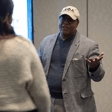
11. Lambda | Suicide Prevention with Dennis Gillan
September is Suicide Prevention Month. It's a topic that Dennis Gillan knows too well after losing his two brothers to suicide. Still, Dennis manages to make students see the wonders and joys of life while delivering sobering insights in his talks. As a fraternity man, Dennis talks about why "Dudes Need Dudes."
About the Guest
Dennis Gillan is the executive director of Half a Sorrow Foundation, an international suicide prevention and mental health advocacy speaker, and author. A speaker with Greek University, Dennis’s life has been deeply touched by suicide after the loss of both of his brothers to suicide, eleven years apart. His 2020 TEDx talk “Dying Alone” has gained over 41 million views. Dennis dedicates his time and energy to promoting real conversations, and he combines his losses with real-world solutions and even some laughter.
A lifelong member of and former regional advisor for Phi Sigma Kappa fraternity, Dennis has served the community in several capacities. He served on the board of the South Carolina chapter of the American Foundation for Suicide Prevention, he volunteered at the Suicide Prevention Lifeline, and he volunteered with NAMI to do crisis intervention training. Dennis also facilitates a monthly survivor of suicide loss meeting, and he is trained in Question—Persuade—Refer (QPR), SafeTalk, ASIST and several other suicide prevention programs. He also worked at South Carolina Department of Mental Health on suicide prevention grants.
Ethocast is a "For Our Edification" limited series and is supported by Edify Ventures, LLC.



















